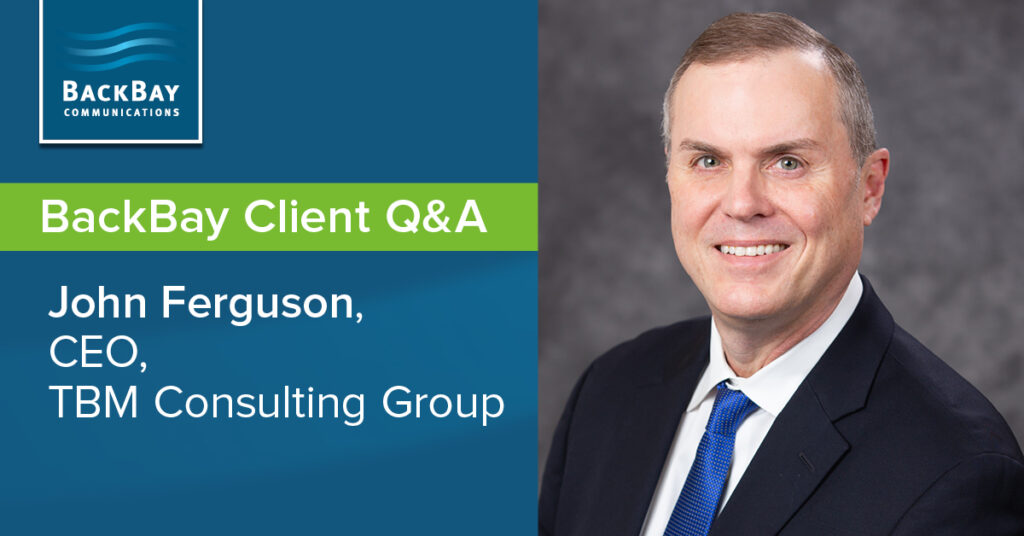
You have spent many years as an executive leader in the consulting industry, including at E&Y prior to TBM, and much of that was dealing with international supply chain issues. How much of a surprise were the recent supply chain issues stemming from Covid and geopolitical issues?
I don’t know if the supply chain issues were a surprise. What was a surprise were the events that triggered them. I think for a long time, those paying attention realized that supply chains were getting further and further extended, which made sense when viewed solely from a cost perspective. But when you looked at some of the ancillary issues around risk and transit and instability, maybe that wasn’t the best approach. I don’t think anybody anticipated Covid or that we would have global shutdowns as a result. Maybe we were all naïve.
On the geopolitical front, we had a relatively long period of stability starting in the early nineties. Changes in the Soviet Union, the launch of the World Trade Organization in 1995, and China’s admission to the WTO in 2001, gave us a couple of decades where extended global supply chains made absolute sense. Unfortunately, this was followed by trade wars, and growing conflict between some of the big players. And frankly, I think we can expect more regional conflict. So, while we had a good run, I think now it is time, as people are doing, to rethink and diversify global supply chains.
Are we out of the woods yet on global supply chain disruptions? And what are the top things U.S. manufacturers should consider to be better prepared for future disruptions?
I don’t think we’re out of the woods. Hopefully, we don’t have another Covid. As for political instability, I don’t see a light at the end of the tunnel. Hopefully, I’m wrong, but I think we’ll continue to see issues popping up in different locations that will impact global supply networks. Given the situation, I think companies need to look at alternative sources. They need to diversify their supply base, whether that means complete reshoring to the U.S., which is an option for some companies, or nearshoring and moving some of their production to Mexico or other Central American or South American countries.
I think nearshoring is a very viable option and many U.S. companies are doing so or are considering such a move. Obviously, companies in Western Europe will be looking at other options for nearshoring. These might include moving more production to Eastern Europe, although much of that market has matured over the past 25 to 30 years. We could see increased migration to countries with highly developed markets such as Poland and the Czech Republic, and possibly to Bulgaria and Romania as well.
I also think companies will continue to look for opportunities to move at least a portion of their supply chain from Mainland China to other East Asian countries such as Thailand, Vietnam, Malaysia, Indonesia, Korea, and even Japan although it’s a very mature market.
Companies need to step back, look at the whole picture, and factor all the risks into their decision making. I think many companies are getting away from solely cost-focused decision making, which has come back to bite them over the last three years.
What should private equity firms think about both as part of their due diligence prior to purchasing companies, and post-acquisition, in regard to supply chain issues?
I think private equity firms need to look more at supply chain operations when they’re evaluating deal structures. Historically, they’ve spent a lot of time looking to invest either in companies with untapped growth potential that they feel they can unlock through their investment, or in broken companies, where they think they can improve management and operations to drive value. We’ve worked with PE firms on operational diligence, looking at the operational, manufacturing and supply chain capabilities of companies they’re looking to acquire.
I think you’ll see more of an emphasis on the supply chain aspects of diligence. Private equity firms will want to understand the risks associated with a prospective portfolio company’s current supply base and the plans to mitigate that risk, including diversification.
For many private equity firms, supply chain issues have been a disruptor for their portfolio companies over the past couple of years. In many cases this has either set back timelines to achieve their growth objectives or made them recalibrate what those goals should be. I think they will be looking – just as public companies are doing – to reevaluate the structure of their portfolio companies’ supply chains and look for opportunities to mitigate risk, so hopefully, they don’t have to deal with the issues to this degree in the future.
Human capital issues also were exacerbated by Covid and initial layoffs were followed quickly by a hiring push as the “Great Resignation” led many workers to quit or switch jobs for higher pay, and managers scrambled to fill vacancies, often at higher salaries. The power was in the hands of the workers. Has the balance of power tipped back to management?
Despite the economic slowdown, I don’t think we’re seeing companies with access to the volume of workers they’re necessarily looking for. When I say the volume, I mean individuals with the right skills at the right pay rates. I think today both sides have power in the relationship. I think another kind of tension is related to working from home. Of course, we’ve seen a lot of layoffs, particularly at large tech firms in Silicon Valley and elsewhere over the last six months or so. And it’s my understanding that in many cases, one of the original filters in determining who would be dismissed was whether an individual was willing to return to the office and be a team player and part of the organization. If you expressed any resistance to that, you moved to the top of the line to be let go. Looking ahead, I think you’re going to see more of that.
Tech is primarily a white-collar workforce, but even on the manufacturing side, there’s probably more balance right now. I don’t know that either side has more leverage. It differs company by company and from one geographic labor area to another. You are seeing a lot of people move to the South and the Sunbelt, much of that for tax reasons. I think companies with manufacturing in those states are probably going to have a much easier time finding the labor they need. If you’re a manufacturer in a state with a net migration out, it’s going to become more difficult to hire the people you want.
Do you think hybrid working is here to stay for professional services jobs, or do you see a movement back to the office taking hold?
I think we all learned a lot of lessons about what’s possible and productive in terms of working remotely. I think there were a lot of people that had this vision because of Covid and going to an almost 100% remote model in many office-based businesses that it was a revolutionary mindset change and there’s no reason to go back. I disagree. I think there’s probably room for some middle ground. There are certain kinds of activities where productivity can be just as great working remotely as when teams are together in an office environment.
But there are a lot of things that while they can be done remotely, the work is not as productive. Somebody told me that all the great ideas don’t happen in meetings. They happen before and after the meeting, during the break, when people are talking. And when you’re in a remote meeting, none of that takes place. We all turn off our computers, we get coffee, we go to the bathroom, we don’t have the time together alone to chat and casually brainstorm.
How has public relations helped TBM build its brand?
I think BackBay, as our PR agency, helps us in a variety of ways to sharpen our focus and our message. You listen to what we have to say and help us package and express that in a way that resonates with the marketplace. Your team and ours listen to our practitioners and subject matter experts and help take us to the next level in terms of positioning and conveying our message to our target audiences. You have an expertise that we don’t, to understand our message and how to get it in front of the right people and in the right forms. This is far beyond what we could do on our own.
What the leaders at TBM and I have also enjoyed is the relationship building with writers at different publications, to the point where they feel comfortable reaching out to us directly to give our input on a particular topic. If we can share our perspective on relevant topics, events or situations in the market that could be helpful to other leaders in manufacturing and private equity firms, we are doing our job.


